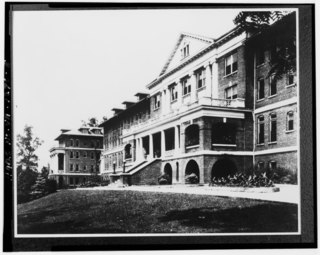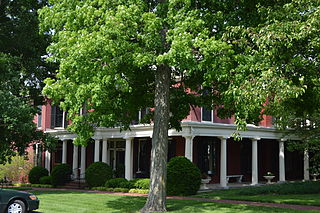
Hanover is a town in Hanover Township, Jefferson County, southeast Indiana, along the Ohio River. The population was 3,546 at the 2010 census. Hanover is the home of Hanover College, a small Presbyterian liberal arts college. The tallest waterfall in Indiana, Fremont Falls, is located in Hanover.

Paris is a home rule-class city in Bourbon County, Kentucky, and the county seat. It lies 18 miles (29 km) northeast of Lexington on the Stoner Fork of the Licking River. It is part of the Lexington–Fayette Metropolitan Statistical Area. As of 2020, it had a population of 10,171.

Hardinsburg is a home rule-class city in Breckinridge County, Kentucky, in the United States. It is the seat of its county. The population was 2,343 at the 2010 census. Hardinsburg was named after Captain William Hardin.

Stanford is a home rule-class city in Lincoln County, Kentucky, United States. It is one of the oldest settlements in Kentucky, having been founded in 1775. Its population was 3,487 at the 2010 census and an estimated 3,686 in 2018. It is the county seat of Lincoln County. Stanford is part of the Danville Micropolitan Statistical Area.

Mount Sterling, often written as Mt. Sterling, is a home rule-class city in Montgomery County, Kentucky, United States. The population was 7,558 as of the 2020 census, up from 6,895 in 2010. It is the county seat of Montgomery County and the principal city of the Mount Sterling micropolitan area.
The Methodist Episcopal Church, South was the American Methodist denomination resulting from the 19th-century split over the issue of slavery in the Methodist Episcopal Church (MEC). Disagreement on this issue had been increasing in strength for decades between churches of the Northern and Southern United States; in 1845 it resulted in a schism at the General Conference of the MEC held in Louisville, Kentucky.

Asbury University is a private Christian university in Wilmore, Kentucky. Although it is a non-denominational school, the college is aligned with the Wesleyan-Holiness movement and is a member of the Wesleyan Holiness Connection. The school offers 50-plus majors across 17 departments. In the fall of 2016, Asbury University had a total enrollment of 1,854: 1,640 traditional undergraduate students and 214 graduate students. The campus of Asbury Theological Seminary, which became a separate institution in 1922, is located across the street from Asbury University.

Kentucky Wesleyan College (KWC) is a private Methodist college in Owensboro, Kentucky. Fall 2018 enrollment was 830 students.
Asbury Theological Seminary is a Christian Wesleyan seminary in the historical Methodist tradition located in Wilmore, Kentucky. It is the largest seminary of the Wesleyan-Holiness movement. It is known for its advocacy of egalitarianism, giving equal status for men and women in ministerial roles and for ordination. It is accredited by the Commission on Colleges of the Southern Association of Colleges and Schools and the Association of Theological Schools in the United States and Canada (ATS).

Wesley Theological Seminary is a United Methodist Church seminary in Washington, D.C. It was founded in 1882.

The Suffolk House refers to two early residences built on the same site located some four miles west of George Town, Penang, Malaysia. Located on the banks of the Air Itam River, the earliest of the two buildings is notable for having served as the residence of Francis Light, the founder of the first British settlement on Penang. Following Light's death in 1794, and with Penang becoming the fourth presidency of India in 1805, a newer Suffolk House replaced the original house, assuming multiple roles before it was later neglected and subsequently restored.
Settlement schools are social reform institutions established in rural Appalachia in the early 20th century with the purpose of educating mountain children and improving their isolated rural communities.
Hindman Settlement School is a settlement school located in Hindman, Kentucky in Knott County. Established in 1902, it was the first rural settlement school in America.

Sullins College was a Methodist junior college for women in Bristol, Virginia, United States. Founded about 1868 and named for David Sullins, a Methodist minister, it ceased operations after the class of 1976 graduated.
John Wesley Hughes was an American minister. He was born in Owen County, Kentucky and was converted at the age of sixteen in a Methodist revival meeting in an old schoolhouse. Hughes attended Kentucky Wesleyan College in Millersburg, Kentucky, and served as a pastor in the Kentucky Conference of the Methodist Church before pursuing further education at Vanderbilt University in Nashville, Tennessee.
Stuart Robinson School was a settlement school in Blackey, Letcher County, Kentucky, established in 1913 as a Presbyterian mission. It closed in 1957, after graduating its last class in 1956.

Science Hill School, originally known as the Science Hill Female Academy was founded on March 25, 1825, by Julia A. Tevis as a female preparatory school. In 1975 the school was placed on the National Register of Historic Places and in 1978, it was opened as a restaurant known as the Science Hill Inn by Donna Gill and Tim Barnes.

Martha Watts was an American missionary and school teacher who established four educational facilities in Brazil. Educated in Kentucky at the Louisville Normal School, she was in the first graduating class in the early 1870s and became a teacher, working in the public schools. After joining the Broadway Methodist Church in 1874, Watts joined a youth missionary society and founded a Sunday school class. In 1881, after applying to the Women's Board of Foreign Missions, she was accepted as the second woman from the United States to act as a foreign missionary and was the first woman to be sent to Brazil.

Belle Harris Bennett led the struggle for and won laity rights for women in the Methodist Episcopal Church, South. She was the founding president of the Woman's Missionary Council of the Southern Methodist Church. Much of her work including fundraising and organizational efforts to provide higher education for a new professional class of social workers and community organizers in the Southern Methodist Church in the U.S. and abroad. Her carefully collaborative support for African Americans and immigrants was considered radical at that time by Southerners. She was a suffragist and supporter of temperance as well.

Margaret Rose Sanford was an American civic leader, teacher, and philanthropist who, as the wife of Terry Sanford, served as First Lady of North Carolina from 1961 to 1965. Prior to entering public life, she worked as a teacher in North Carolina and Kentucky. As first lady, Sanford hosted the first annual North Carolina Symphony Ball in 1961, established a library of North Carolinian books at the North Carolina Executive Mansion, and planted a rose garden on the mansion's grounds. She was the first governor's wife to decorate the Governor's Western Residence in Asheville. Sanford sent her children to the first racially integrated public elementary school in Raleigh, North Carolina, while the family lived in the executive mansion. She served on the board of the Methodist Home for Children, the North Carolina School of the Arts, the Stagville Plantation Restoration Board, and East Carolina University. She was also a member of the Education Commission of the States and the Defense Department Advisory Committee on Women in the Services. While Sanford's husband served as president of Duke University, she was appointed by Governor Jim Hunt to serve on a delegation of university faculty and administrators to China in 1975.














